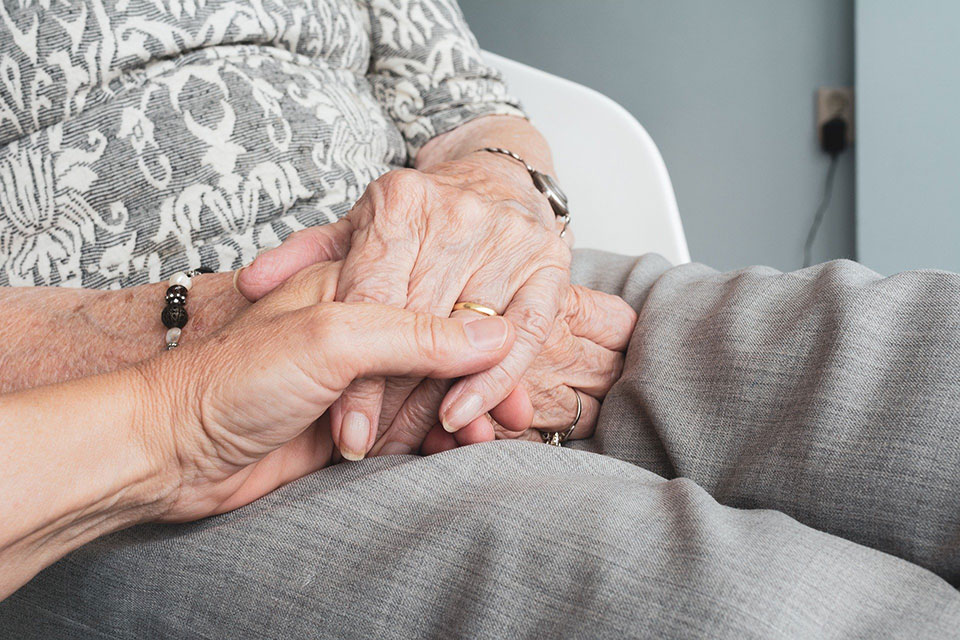Finding the Light at the End of the Road
February 18, 2020 Heather Cook, PharmD
Pharmacy resident shares lessons learned from her time as a hospice volunteer.
“Are you up for a game of cards today?” She looks up, smiles, and nods. I can see a light in her eyes that wasn’t there before. I get up to clean her bedside tray and she says, “You’re my bestest friend.” I hold up the cards for her, and we play two rounds of her favorite card game, Go Fish. One win for her, and the next game is a tie — I may or may not stack the cards in her favor once in a while. She laughs along the way, having more fun in this one hour than she’s had all week. Because, for that one hour, I can distract her from her physical pain and from feeling down about living the rest of her life in a nursing home.
As a postgraduate Year 2 pain and palliative care pharmacy resident at the School of Pharmacy, one of my requirements is to spend a minimum of 10 hours volunteering for a local hospice organization. It was during my time as a hospice volunteer in August 2019 that I had the honor of meeting this woman, who I’ve been visiting just about every weekend since.
Making an Unexpected Connection
Throughout the last six months, we’ve celebrated many different occasions together. For her birthday, I brought in balloons and small gifts, including stick-on earrings. For Christmas, we made decorations out of pine tree branches and ribbons to hang in her room while singing Christmas carols. For New Year’s Day, I brought her goofy-looking “2020” sunglasses and a new pair of cozy socks. She’s always so grateful.
As a hospice volunteer, I am encouraged to ask “life review” questions that open up conversations to help build a deeper, trusting relationship, such as:
- Have you always lived in Maryland?
- What’s your favorite food?
- What is your family like?
- What did you do for a living?
I always try to sneak in one or two of these questions every time I see her. Additionally, at each visit, I conduct a symptom assessment to evaluate for shortness of breath, nausea, anxiety, and pain. If any of these symptoms are present, I alert the facility and hospice on-call nurses.
Improving Another’s Life While Gaining Hands-On Learning
Being a hospice volunteer is exceptionally rewarding. I’ve found that my favorite time to visit is Friday evening to help end my work week on a positive note and start my weekend by making a difference. Through this role, I’m also able to advocate for her needs. In a nursing home setting, it’s always beneficial to have a second set of eyes and ears to monitor her symptoms.
I’ve learned many lessons during my time as a hospice volunteer that have helped improve the patient care skills that I use in my clinical rotations each day, including:
- Behind every medical record number, there is a person with unique feelings, beliefs, and values. Every person has a story, and determining what is important to your patient can provide insight into how you can be most helpful.
- Active listening leads to more meaningful connections than talking. “Tell me more” might be the three most important words in palliative medicine.
- Play along with delusions (as long as they are not harmful to the patient or others, of course). There is no sense in arguing with someone else’s perception of reality. You might even get a laugh out of it!
- Appreciate all you have and be grateful for the small things in life, such as being able to drive a car, eat a cookie, go outside for a walk, and spend time with family.
- Making a difference does not require money. Spending just one hour a week of your time can dramatically improve someone else’s life.
Everyone Can Make a Difference
In 1983, Medicare established a law that requires hospice organizations to have at least 5 percent of their total patient care hours provided by volunteers. Therefore, anyone who is looking to give back to their community for just a couple of hours each month is encouraged to apply. You do not have to be a “special person” to be a hospice volunteer. You only need to be kind and have a desire to serve. Every volunteer has unique qualities to bring to the table.
If you have any questions about volunteering at a hospice organization, please feel free to email me at heathercook@rx.umaryland.edu. I am happy to tell you more about my experience and how to get involved.